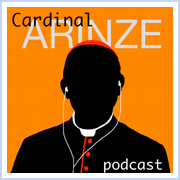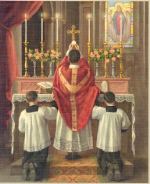From: Matthew 5:1-12aThe Beatitudes[1] Seeing the crowds, He (Jesus) went up on the mountain, and when He sat down His disciples came to Him. [2] And He opened His mouth and taught them, saying: [3] "Blessed are the poor in spirit, for theirs is the Kingdom of Heaven. [4] Blessed are those who mourn, for they shall be comforted. [5] Blessed are the meek, for they shall inherit the earth. [6] Blessed are those who hunger and thirst for righteousness, for they shall be satisfied. [7] Blessed are the merciful, for they shall obtain mercy. [8] Blessed are the pure of heart, for they shall see God. [9] Blessed are the peacemakers, for they shall be called children of God. [10] Blessed are those who are persecuted for righteousness' sake, for theirs is the Kingdom of Heaven. [11] Blessed are you when men revile you and persecute you and utter all kinds of evil against you falsely on My account. [12] Rejoice and be glad, for your reward is great in Heaven."
****************
Commentary:
1. The Discourse, or Sermon, on the Mount takes up three full chapters of St. Matthew's Gospel--Chapters 5-7. It is the first of the five great discourses of Jesus which appear in this Gospel and it contains a considerable amount of our Lord's teaching.
It is difficult to reduce this discourse to one single theme, but the various teachings it contains could be said to deal with these five points: 1) the attitude a person must have for entering the Kingdom of Heaven (the Beatitudes, the salt of the earth, the light of the world, Jesus and His teaching, the fullness of the Law); 2) uprightness of intention in religious practice (here the "Our Father" would be included); 3) trust in God's fatherly providence; 4) how God's children should behave towards one another (not judging one's neighbor, respect for holy things, the effectiveness of prayer, and the golden rule of charity); 5) the conditions for entering the Kingdom (the narrow gate, false prophets and building on rock).
"He taught them": this refers both to the disciples and to the multitude, as can be seen at the end of the Sermon (Matthew 7:28).
2. The Beatitudes (5:3-12) form, as it were, the gateway to the Sermon on the Mount. In order to understand the Beatitudes properly, we should bear in mind that they do not promise salvation only to the particular kinds of people listed here: they cover everyone whose religious dispositions and moral conduct meet the demands which Jesus lays down. In other words, the poor in spirit, the meek, those who mourn, those who hunger and thirst after righteousness, the merciful, the pure in heart, the peacemakers and those who suffer persecution in their search for holiness--these are not different people or kinds of people but different demands made on everyone who wants to be a disciple of Christ.
Similarly, salvation is not being promised to different groups in society but to everyone, no matter what his or her position in life, who strives to follow the spirit and to meet the demands contained in the Beatitudes.
All the Beatitudes have an eschatological meaning, that is, they promise us definitive salvation not in this world, but in the next. But the spirit of the Beatitudes does give us, in this life, peace in the midst of tribulation. The Beatitudes imply a completely new approach, quite at odds with the usual way man evaluates things: they rule out any kind of pharisaical religiosity, which regards earthly happiness as a blessing from God and a reward for good behavior, and unhappiness and misfortune as a form of punishment. In all ages the Beatitudes put spiritual goods on a much higher plane than material possessions. The healthy and the sick, the powerful and the weak, the rich and the poor--all are called, independently of their circumstances, to the deep happiness that is experienced by those who live up to the Beatitudes which Jesus teaches.
The Beatitudes do not, of course, contain the entire teaching of the Gospel, but they do contain, in embryo, the whole program of Christian perfection.
3. This text outlines the connection between poverty and the soul. This religious concept of poverty was deeply rooted in the Old Testament (cf., e.g., Zephaniah 2:3ff). It was more to do with a religious attitude of neediness and of humility towards God than with material poverty: that person is poor who has recourse to God without relying on his own merits and who trusts in God's mercy to be saved. This religious attitude of poverty is closely related to what is called "spiritual childhood". A Christian sees himself as a little child in the presence of God, a child who owns nothing: everything he has comes from God and belongs to God. Certainly, spiritual poverty, that is, Christian poverty, means one must be detached from material things and practice austerity in using them. God asks certain people--religious--to be legally detached from ownership and thereby bear witness to others of the transitoriness of earthly things.
4. "Those who mourn": here our Lord is saying that those are blessed who suffer from any kind of affliction--particularly those who are genuinely sorry for they sins, or are pained by the offenses which others offer God, and who bear their suffering with love and in a spirit of atonement.
"You are crying? Don't be ashamed of it. Yes, cry: men also cry like you, when they are alone and before God. Each night, says King David, I soak my bed with tears. With those tears, those burning manly tears, you can purify your past and supernaturalize your present life" ([St] J. Escriva, "The Way", 216).
The Spirit of God will console with peace and joy, even in this life, those who weep for their sins, and later will give them a share in the fullness of happiness and glory in Heaven: these are the blessed.
5. "The meek": those who patiently suffer unjust persecution; those who remain serene, humble and steadfast in adversity, and do not give way to resentment or discouragement. The virtue of meekness is very necessary in the Christian life. Usually irritableness, which is very common, stems from a lack of humility and interior peace.
"The earth": this is usually understood as meaning our Heavenly Fatherland.
6. The notion of righteousness (or justice) in Holy Scripture is an essentially religious one (cf. notes on Matthew 1:19 and 3:15; Romans 1:17; 1:18-32; 3:21-22 and 24). A righteous person is one who sincerely strives to do the Will of God, which is discovered in the commandments, in one's duties of state in life (social, professional and family responsibilities) and through one's life of prayer. Thus, righteousness, in the language of the Bible, is the same as what nowadays is usually called "holiness" (1 John 2:29; 3:7-10; Revelation 22:11; Genesis 15:6; Deuteronomy 9:4).
As St. Jerome comments ("Comm. on Matthew", 5, 6), in the fourth Beatitude our Lord is asking us not simply to have a vague desire for righteousness: we should hunger and thirst for it, that is, we should love and strive earnestly to seek what makes a man righteous in God's eyes. A person who genuinely wants to attain Christian holiness should love the means which the Church, the universal vehicle of salvation, offers all men and teaches them to use--frequent use of the Sacraments, an intimate relationship with God in prayer, a valiant effort to meet one's social, professional and family responsibilities.
7. Mercy is not a just a matter of giving alms to the poor but also of being understanding towards other people's defects, overlooking them, helping them cope with them and loving them despite whatever defects they may have. Being merciful also means rejoicing and suffering with other people.
8. Christ teaches us that the source of the quality of human acts lies in the heart, that is, in a man's soul, in the depths of his spirit. "When we speak of a person's heart, we refer not just to his sentiments, but to the whole person in his loving dealings with others. In order to help us understand divine things, Scripture uses the _expression `heart' in its full human meaning, as the summary and source, _expression and ultimate basis, of one's thoughts, words and actions. A man is worth what his heart is worth" ([St] J. Escriva, "Christ Is Passing By", 164).
Cleanness of heart is a gift of God, which expresses itself in a capacity to love, in having an upright and pure attitude to everything noble. As St. Paul says, "whatever is true, whatever is honorable, whatever is just, whatever is pure, whatever is lovely, whatever is gracious, if there is any excellence, if there is anything worthy of praise, think about these things" (Philippians 4:8). Helped by God's grace, a Christian should constantly strive to cleanse his heart and acquire this purity, whose reward is the vision of God.
9. The translation "peacemakers" well convey the active meaning of the original text--those who foster peace, in themselves and in others and, as a basis for that, try to be reconciled and to reconcile others with God. Being at peace with God is the cause and effect of every kind of peace. Any peace on earth not based on this divine peace would be vain and misleading.
"They shall be called sons of God": this is an Hebraicism often found in Sacred Scripture; it is the same as saying "they will be sons of God". St. John's first letter (3:1) provides a correct exegesis of this Beatitude: "See what love the Father has given us, that we should be called children of God; and so we are".
10. What this Beatitude means, then, is: blessed are those who are persecuted because they are holy, or because they are striving to be holy, for theirs is the Kingdom of Heaven.
Thus, blessed is he who suffers persecution for being true to Jesus Christ and who does so not only patiently but joyfully. Circumstances arise in a Christian's life that call for heroism--where no compromise is admissible: either one stays true to Jesus Christ whatever the cost in terms of reputation, life or possessions, or one denies Him. St. Bernard ("Sermon on the Feast of All Saints") says that the eighth Beatitude is as it were the prerogative of Christian martyrs. Every Christian who is faithful to Jesus' teaching is in fact a "martyr" (a witness) who reflects or acts according with this Beatitude, even if he does not undergo physical death.
11-12. The Beatitudes are the conditions Jesus lays down for entering the Kingdom of Heaven. This verse, in a way summing up the preceding ones, is an invitation to everyone to put this teaching into practice. The Christian life, then, is no easy matter, but it is worthwhile, given the reward that Jesus promises.
************
Source: "The Navarre Bible: Text and Commentaries". Biblical text taken from the Revised Standard Version and New Vulgate. Commentaries made by members of the Faculty of Theology of the University of Navarre, Spain. Published by Four Courts Press, Kill Lane, Blackrock, Co. Dublin, Ireland.
Reprinted with permission from Four Courts Press and Scepter Publishers, the U.S. publisher.










